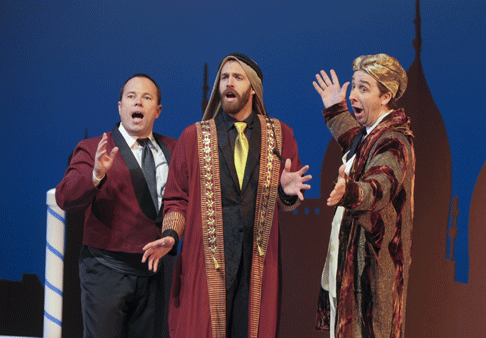Undertaken in response to a desperate plea from the Teatro San
Benedetto in Venice to fill a gap in the spring schedule, Rossini’s opera was
completed in an astonishing twenty-seven days. It was the work of a young man
— it could be argued that all of Rossini’s operas are the works of a young
man, since he retired from the theater at thirty-eight — but by no means an
inexperienced one: La scala di seta, La pietra del paragone,
and Tancredi were already behind him. The impress of Mozart’s most
ebullient moments is still heavy on the very young Rossini, but this is a kind
of Mozart in constant and barely controlled agitation: not for Rossini the long
lyrical lines of his friend in later life, Vincenzo Bellini. The libretto,
which had already been set by Luigi Mosca just a few years earlier, is a
farcical continuation of the European fascination with Turkish, and more
broadly Middle Eastern, themes and ideas: the dauntless Isabella, fortuitously
shipwrecked in Algiers, chances upon her lost lover, now enslaved, and
contrives to free herself and him, while making a fool of the Bey Mustafa.
Director Minter and designer Dobay have resituated the piece in the present
day, in a place more or less like the U.A. E. (so much for Algiers!), which has
made an uneasy compromise with Western culture — the Bey and his wives in
more or less traditionally Arab garb, while the Bey’s henchmen wear shirts
and trousers. The dazzling single set suggested the jewel-toned interiors of a
palace, with easy access to a stylized dock, while cinnamon-colored silhouettes
suggested the towers of the city beyond and around the action; it made the best
of the stage, urging the cast forward toward the audience. It seems to have
been, if one reads the notes, the intention of both the music director and the
stage director to bring an undercurrent of real danger to the proceedings
(Barbary pirates! Sexism!), but happily this ambition had faded out within half
an hour. For all that we know about Rossini’s flexibility in supplying new
arias for new cities or singers, his dramaturgy at its best proceeds with
ironclad determination: Rossini’s unstoppable music and the dramatic flow it
illustrates tell us insistently that this is a farce, not a melodrama. There is
no way to confuse Italiana with The Death of Klinghoffer.
Mustafa is not menacing: he’s infantile; he’s been declawed by the end of
the first act.
As the richly characterized Isabella, the fourth of the flexible roles for
the low-meezo voice Rossini cherished (but not the last: Rosina and Angelina
were to follow) Eddy sang with notable accuracy, and her remarkable beauty was
underscored by her comic flair. Downs must be one of the younger and
better-looking Mustafas on record. There was a certain active tone in his voice
which, while a benefit to lyrical singing, slightly blurred some of his
passage-work. As the hapless Lindoro, Williams sang well, very much in the
manner of the Irish tenor, with that high and forward placement. Kravitz’s
Taddeo was an agreeable goof, while Jakubiak, in the rather thankless role of
the rejected wife, acquitted herself well, despite passing pitch inaccuracies
in the first act. BMO reduced Rossini’s male double-chorus to four voices —
the Bey’s muscle — which made sense dramaturgically, but effectively
reduced the piece to a chamber opera. Wyner’s orchestra played with a clean
accuracy, although the singers were occasionally tempted to get ahead of
her.
 (L-R) Sandra Piques Eddy as Isabella, Sara Jakubiak as Elvira, and Eric Downs as Mustafa
(L-R) Sandra Piques Eddy as Isabella, Sara Jakubiak as Elvira, and Eric Downs as Mustafa
One of the challenges of Angelo Anelli’s quite serviceable libretto is the
nature of Isabella’s relationship with the men in her life. Who is Taddeo
(Kravitz) — cast-off lover? Failed suitor? Is he an old man, a pantalone, or
just a luckless young or middle-aged one? One has the notion that Anelli never
quite decided, and the age-old uncertainty hovers over this production as it
does over most. How can Lindoro (Williams), passive in his captivity while
awaiting his Isabella, seem more than effete? It is remarkably difficult to
bring Lindoro into focus, and almost impossible, dramaturgically, to bring them
into focus together. The comedy is almost reducible to a contest of wills
between the spirited Isabella and the schoolyard-bully Mustafa. As the
conductor’s notes rightly point out, it is a specimen also of the
then-popular “rescue” opera. She fails to mention, however, its striking
resemblance to the greatest “rescue” opera, which similarly features a
surprising female rescuer: Fidelio, the first version of which
predated Italiana by eight years, and the final version of which
followed it by only a year. These operas, like the contemporary writings of
Madame de Stael and Mary Wollstonecraft, ask: what is the capacity of a woman?
In Rossini’s works, the woman steadily loses power, until she is a sinner
(Semiramide), and then hardly more than a cipher (Comte Ory;
Guillaume Tell).
 (L-R) Bradley Williams as Lindoro, Eric Downs as Mustafa, and David Kravitz as Taddeo
(L-R) Bradley Williams as Lindoro, Eric Downs as Mustafa, and David Kravitz as Taddeo
We have little trouble now in agreeing with the very young Rossini on the
joys of seeing a woman exert all the force of her beauty and wit — but what
of the mode alla Turca? Minter’s version, which connects the dots
between the Turkish threat circa 1800 and today’s oil magnates with shady
“shipping” practices, hardly diminishes the cultural chauvinism of the
original, and concludes in the same place. It is just more fun, according to
Anelli and Rossini, to be Italian than anything else, and Isabella and her
friends want nothing better than to be back home, where women are free;
Minter’s production, which concludes with the Bey’s thugs converted to
pseudo-Italian clothing (to the point of waving little Italian flags), ready to
expatriate, and the Bey himself, as well as his wife, in semi-Western garb,
tacitly agrees with them, cultural anxiety notwithstanding. Still, Boston
Midsummer Opera delivers a Rossini production of great verve and clarity — a
real summer pleasure.
Graham Christian
image=http://www.operatoday.com/IGIA-2.gif
image_description=Sandra Piques Eddy is Isabella [Photo by Chris McKenzie courtesy of Boston Midsummer Opera]
product=yes
product_title=Gioacchino Rossini: The Italian Girl in Algiers (L’Italiana in Algeri)
product_by=Isabella: Sandra Piques Eddy; Lindoro: Bradley Williams; Taddeo: David Kravitz; Mustafa: Eric Downs; Elvira: Sara Jakubiak; Zulman: Julia Mintzer; Ali: David Lara. Vocal Quartet/Chorus: Sean Lair, Michael Kuhn, Stephen Humeston, Joshua Taylor. Music Director and Conductor: Susan Davenny Wyner; Stage Director: Drew Minter; Scenic Designer: Stephen Dobay. Tsai Performance Center, Boston, 27, 29, 31 July 2011.
product_id=Above: Sandra Piques Eddy as Isabella
All photos by Chris McKenzie courtesy of Boston Midsummer Opera